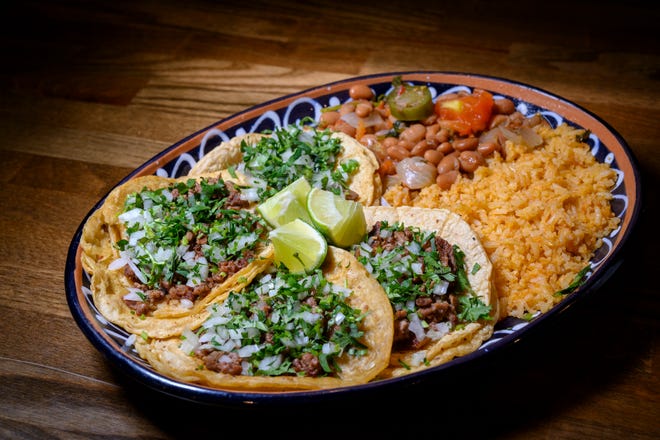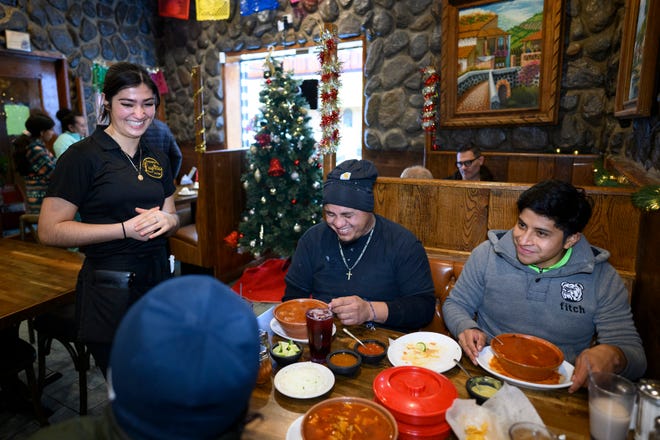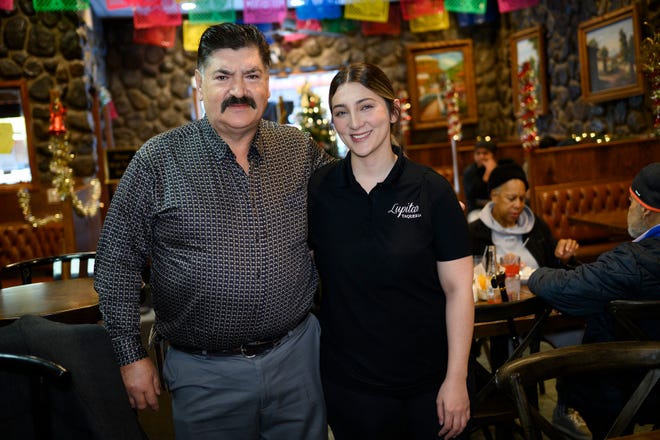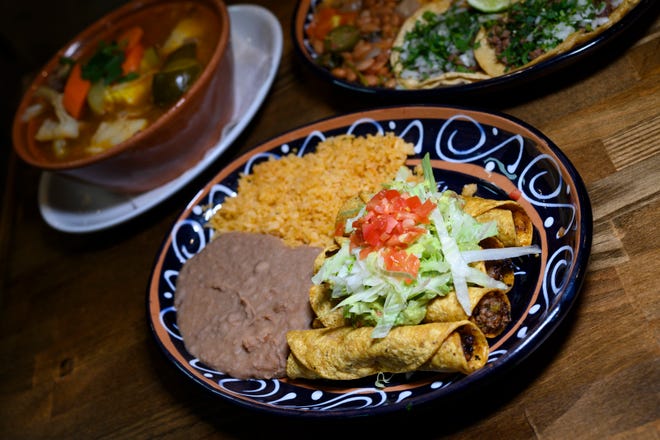Tiny southwest Detroit eatery sparked a movement

[ad_1]
On this season of giving thanks, Metro Detroit owes an enormous debt to the tiny taqueria in southwest Detroit that sparked a motion: placing conventional tacos on a menu.
Right now, scores of eating places, taco vans, grocers, celebration shops, bars and even a couple of gasoline stations in Metro Detroit provide “avenue tacos”: often a gentle, corn tortilla crammed with meat and topped with onions and cilantro. Many say the primary eatery to take action, a minimum of in latest historical past, was Taqueria Lupita’s, which opened in 1994.

Lupita’s and its house owners are additionally a part of the ‘90s-era wave of Mexican immigrants that infused southwest Detroit, the guts of the Latino neighborhood, with new individuals and a bunch of small companies, from eating places to magnificence salons to development to auto restore, a lot of which nonetheless exist. Various city economic studies show it’s those businesses that kept commercial corridors on West Vernor, Bagley and Springwells strong whilst many neighborhood corridors within the metropolis declined. Quickly, the house owners of the family-run Lupita’s might be part of the Latino-fueled revival occurring in Lincoln Park.
Lupita’s is ready up in a touristy strip of Bagley Avenue a couple of blocks from the Ambassador Bridge. The strip is the place a number of common eating places that for many years have served Mexican meals formed by the tastes of Midwesterners, and to some extent, Canadians. Suppose plenty of cheese and stiff margaritas.
Lupita’s was opened by Adan Lopez, who longed to make the tacos he grew up with in his native state of Jalisco in west-central Mexico. “To me, the eating places that had been right here, they had been serving type of Tex-Mex meals,” Lopez mentioned. “I’m not saying that’s unhealthy however I couldn’t get the meals I used to eat again in Mexico.” On the time, Lopez was a cook dinner at a close-by Mexican restaurant. He immigrated to Detroit, like many Mexicans in the course of the ’90s, due to a booming economic system and a reasonable value of dwelling. Lopez saved his full-time job for a minimum of two years whereas spending his off hours fixing up the empty storefront that also homes the small eatery — the place feels full of 20 individuals.
Lupita’s was a recreation changer as quickly because it debuted, recalled some longtime southwest Detroiters.
“There was precise pleasure,” recalled Raymond Lozano, government director of Mexicantown Community Development Corp. “I bear in mind from the beginning, many individuals began to go there on a regular basis. I nonetheless do.” Lozano and others go for tacos that aren’t in laborious shells or smothered in cheese, however gentle four-inch corn tortillas Lopez initially created from scratch. The meat isn’t seasoned floor beef however marinated steak (carne asada) or marinated pork (al pastor). Different choices embody cow tongue (lengua) and intestines (tripas) for the meat or just rice and beans, which is the vegetarian providing.
The beans are totally different, too. They don’t seem to be refried and made with lard. Lupita’s affords frijoles charros, entire pinto beans with bits of bacon, onion and jalapeno. “They had been the primary” to supply such fare, mentioned Vito Valdez, an artist who’s a longtime southwest Detroit resident and neighborhood activist. “I’ve been a fan ever since they opened.”
Lupita’s menu has expanded by means of the years. It affords soups, tortas and different dishes, however tacos are “the star of the menu,” mentioned Serena Maria Daniels, editor of Detroit Eater and founding father of Tostada Magazine. When Daniels first moved to Detroit to 2011, she was taken to Lupita’s by a colleague who needed to indicate her a Mexican eatery that attempted to stick to a standard, regional delicacies. Greater than a decade later, Daniels, like many others, continues to be a buyer.
Loads of eating places in Metro Detroit now provide Mexican fare utilizing conventional delicacies as its base. There are institutions providing vegan, seafood and halal-based Mexican dishes. There’s the TikTok development birria — historically a stew that’s now prominently featured in mash-ups from tacos to ramen — that is popping up throughout city. Different eating places provide a extra upscale ambiance and dishes from totally different areas of Mexico than the realm that shapes Lupita’s menu.

Lopez didn’t intend to begin a development. His fashion of “avenue taco” was so new on the time that he needed to persuade native tortilla maker, La Michoacana, to make the four-inch gentle corn tortilla that many eating places now use. It’s additionally bought in numerous grocery shops.
Whereas some foodies are dismissive of the North American affect of the extra common Mexican eating places round Lupita’s, Lopez has nothing however reward. He’s grateful to the years of recommendation and help from Rudy Morales, the proprietor of Xochimilco Restaurant.
“This man I respect like my father,” Lopez mentioned of Morales. “I nonetheless discuss to him each week.” Lopez mentioned he admires the flexibility to outlive and adapt on this northern metropolis, in a neighborhood that virtually borders Canada. Xochimilco’s and different southwest Detroit eating places have operated for near 50 years now. It was Xochimilco’s as properly others southwest Detroit eating places akin to Los Galanes, Armando’s and Mexican Village that popularized the Detroit-version of nachos known as botana. It is, in fact, loaded with cheese, particularly Muenster, and contains chorizo, beans, onion and different components piled onto corn chips. Even Lupita’s serves botanas.
Daniels say describing the menus of some longtime eating places as Tex-Mex or not genuine is improper. “I’d characterize it as Mexican-American delicacies,” Daniels mentioned. “Authenticity can differ from family to family. When you’ve got been within the U.S. generations, perhaps our mothers cooked in a approach that’s genuine to us, however not everybody.”
Lopez now owns three eating places in Southwest Detroit. Two of his sons function a tire retailer within the neighborhood owned by the household. His daughter, Valeria Lopez, who began as a server ready on tables when she was 15, now manages Lupita’s.

The household’s laborious work has paid off. Now he is prepared to affix the handfuls of Mexican eating places and different small companies which might be more and more filling empty storefronts Downriver. Many Downriver communities are experiencing an infusion of Latino residents transferring into the small municipalities south and west of Detroit. The result’s that Downriver skilled a small inhabitants development for the primary time in 40 years, in line with an evaluation of 2020 census information by the Southeast Michigan Council of Governments. Lincoln Park is the epicenter of this variation, the place one out of each 4 residents is Latino. The town of practically 40,000 residents has two Mexican grocery shops; apanaderia (bakery); bilingual actual property brokers, immigration attorneys, a drive-thru ice cream and coffee shop providing Mexican fruit-based drinks; a restaurant that serves Peruvian-style rotisserie hen and Salvadoran pupusas; and a new Mexican restaurant whose hottest dish is the TikTok-inspired birria ramen. Lopez not too long ago purchased a tire retailer in Lincoln Park. He is also contemplating opening a Mexican restaurant within the metropolis.
“I am not going to alter the menu,” of his potential Downriver eatery, he mentioned. “I like what I serve. Lots of people appear to love it too.”

laguilar@detroitnews.com
[ad_2]
Source link